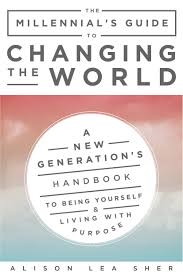The Millennial’s Guide to Changing the World

Truth in Advertising 1: I’ve been working with Alison Sher on what became The Millennial’s Guide to Changing the World since shortly after she returned from the trip during which she interviewed the 200 or so young men and women who are the data base on which this book is based. I’ve been a big fan of hers and of the idea for a long time.
Truth in Advertising 2: I am not a millennial. Far from it. I’m old enough to be Alison’s father. In fact, I went to college with her father, though that is not how I know her.
This is an amazing book about a difficult topic. It is also not the kind of conventional social science book that I typically review. In fact, if you want a dispassionate book on her generation, this book is not for you.
However, if you are looking for a dedicated woman’s exploration of her generation and its role, this is required reading. Especially if you are part of my boomer generation that doesn’t understand hers—and even more importantly if you are skeptical about it.
The book started with an Indiegogo funded trip around the country in which Alison met and interviewed a broad but far from representative sample of her fellow millennials. If the book just reported on what she heard and recorded, it would be a tremendous addition to what we academics call “the literature.” She met an amazing collection of people, a few of whom I also know. They run the gamut from dropouts to reasonably satisfied members of the corporate world. All in all, they paint a picture of a generation that is having a hard time figuring out how it fits in to a less-than-ideal world that mine largely created. On that level, it makes for fascinating reading.
It is also important because Alison and has read and thought a lot about the issues surrounding her generation. I don’t always read the evidence the same ways that she does, but it is hard not to be struck by the critical and creative ways she uses ideas from, for example, modern neuroscience in making sense of what she learned on her road trip. There is a treasure trove of ideas drawn from many of the same intellectual and spiritual worlds that I read in. However, they are presented in ways that reflect her generation’s sensitivities not mine.
In the end, this was an all but impossible book to review by someone who is a reasonably linear social scientist. That’s all the more reason why you should read it.
